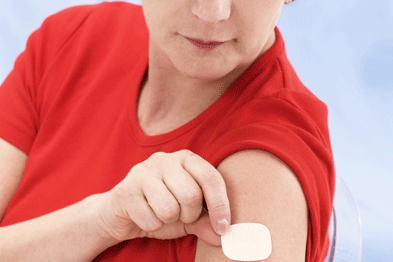Estrogen Therapy Improves Depression & Anxiety in Recently Menopausal Women Without Adverse Cognitive Effects
by The Herald:Kronos Longevity Research Institute (KLRI) today announced that a major finding of the Kronos Early Estrogen Prevention Study (KEEPS) indicates that hormone therapy (HT) improves symptoms of depression and anxiety in recently menopausal women, without adverse effects on cognition. The findings come as a result of a four-year randomized clinical trial involving nearly 730 menopausal women. The findings were presented at the annual meeting of the North American Menopause Society, Oct. 3-6, 2012, in Orlando, Fla."The KEEPS was a complex study to address issues that are important to menopausal women and their caregivers," said KLRI Director and President S. Mitchell Harman, M.D., Ph.D. "These preliminary results are of major clinical significance, as they will help clinicians assess the overall risk-benefit profile for each woman wishing to receive hormone therapy for symptoms of menopause."KEEPS was a four-year randomized, double-blinded, placebo-controlled clinical trial of low-dose oral or transdermal (skin patch) estrogen and cyclic monthly progesterone in 727 healthy women aged 42-59 (mean age, 52.7) who were within three years after menopause at randomization. The participants were randomized into the following three arms, along with cyclical micronized progesterone (Prometrium®):
- Oral conjugated equine estrogens (o-CEE) given as Premarin®, 0.45 mg/day (a lower dose than the 0.625 mg/d used in the Women's Health Initiative [WHI].
- Transdermal Estradiol (t-E2) given by Climara® patch, 50 mcg/day
- Placebo
Of the original 727 women, 662 enrolled in the Cognitive and Affective ancillary study, funded by the National Institutes of Health (NIH). Demographic and health factors relevant to cardiovascular risk in the three treatment groups were comparable at baseline and none of the women had cognitive deficits, dementia, or mood disorders at enrollment.The results of the cognitive study showed that menopausal hormone therapy, especially o-CEE, had beneficial effects on depression and anxiety. In contrast to the Women's Health Initiative Memory Study (WHIMS), which found deleterious effects of HT on cognition in women 65 years and older, KEEPS found no adverse effects of HT on any test of cognition, including the 3MSE memory test, a test of global cognitive abilities used in WHIMS.HT effect on mood:
- Responses on the Profile of Mood States (POMS) questionnaire showed significant improvement in symptoms of depression (p=0.03) and anxiety (p=0.02) for women assigned to receive o-CEE. Additionally, these women, showed a trend for improvement in anger/hostility (p=0.10).
- The Brief Patient Health Questionnaire (BPHQ) showed a trend toward benefit in the symptoms of depression in women taking o-CEE (p=0.09).
HT effect on memory:
- Self-reported ability to recall printed materials, as measured by the Memory Function Question (MFQ), showed a trend of better recall in women taking o-CEE, compared to placebo (p=0.12).
- Self-reported ability to recall past events measured with the MFQ showed a slight increase in memory complaints among women using transdermal estradiol (p=0.05). Similarly, on the same test, these women rated their memory changes as more serious compared to those on placebo (p=0.09).
Rationale for KEEPS The results of the WHI estrogen plus progestin trial, which was halted by the National Institutes of Health in July 2002, prompted a consortium of health researchers to study the risks and benefits of hormone therapy (HT) in a younger subset of women who recently entered menopause. Prior to the WHI, most data suggested HT was associated with a high degree of protection against coronary heart disease and a favorable benefit-risk ratio.Rationale for the KEEPS Cognitive and Affective Study The Women's Health Initiative Memory Study had found adverse effects of HT on the risk of cognitive decline and dementia in women 65 years and older, but had not assessed cognitive outcomes in women younger than 65. Observational studies in newly menopausal women had suggested the possibility of benefits of HT for memory and cognition. The Cognitive and Affective Study is an NIH-funded ancillary study of KEEPS that was coordinated by investigators based at the University of Wisconsin in Madison. It evaluated the potential effects of HT on cognition and mood by administering a comprehensive battery of cognitive tests at four time points: baseline, 18, 36 and 48 months. The data collection procedures were standardized and monitored regularly throughout the study. The cognitive battery included tests shown to be affected by HT and targeted the following domains: global cognition, memory (both verbal and visual), executive function, mood, quality of life, and memory complaints.

